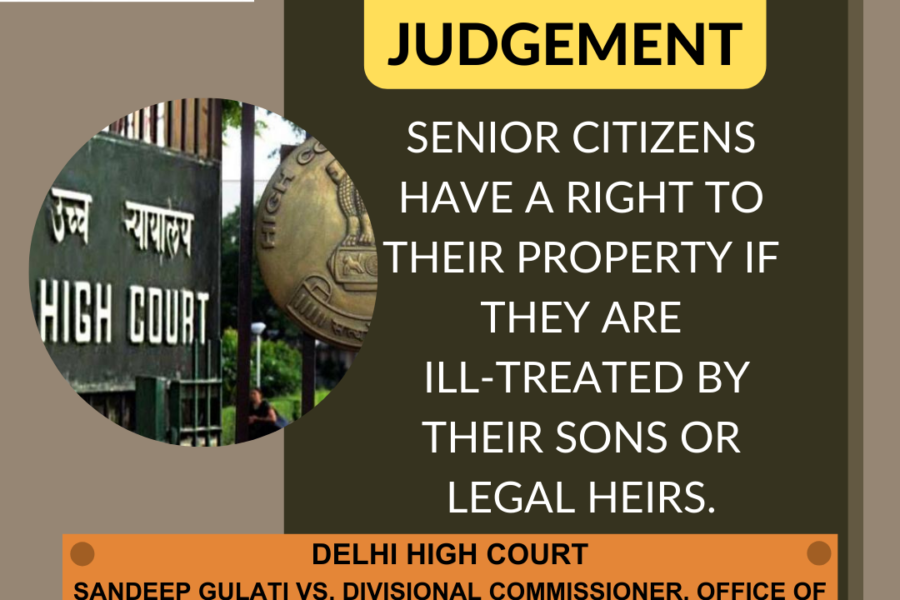This right is protected by various laws and regulations that aim to safeguard the interests and well-being of senior citizens. These laws ensure that senior citizens are not subjected to any form of mistreatment or exploitation, particularly when it comes to their property and assets.
Delhi High Court
SANDEEP GULATI vs. DIVISIONAL COMMISSIONER, OFFICE OF THE SECRETARY,
DEPARTMENT OF REVENUE, GOVT. OF NCT OF DELHI AND ORS
W.P.(C) 2761/2020
Case Analysis
The Single Bench of Navin Chawla observed that the purpose of the proceedings under the Maintenance and Welfare of Parents and Senior Citizens Act, 2007 as well as the Rules, is to provide protection to the parents, including with regard to their property, when interpreting the social welfare law for senior citizens.
“This Act is not intended to punish the children; as a result, the mere fact that the parents do not want their children to reside with them is sufficient to invoke the Act and the Rules once it has been established that the children have no ownership rights over the property of the parents,” the court stated.
Section 22(2) of the Maintenance and Welfare of Parents and Senior Citizens Act, 2007
According to Section 22(2) of the 2007 Maintenance and Welfare of Parents and Senior Residents Act, the state government must establish a thorough action plan to safeguard senior residents’ property and lives. which essentially means that laws pertaining to senior citizens’ and parents’ welfare will be made by the state governments of the individual states. States may have different laws governing this.
References Made by DELHI HC:
According to the ruling in Smt. Darshna v. Government of the NCT of Delhi & Ors., it is clear from the plain language of the Delhi Maintenance and Welfare of Parents and Senior Citizens Rules, 2009, Rule 22(3)(1)(i), that a senior citizen has the right to evict his son, daughter, or legal heir from his property, regardless of whether it was acquired through inheritance or self-acquired. It’s also important to remember that the Delhi High Court ruled that Darshna cannot insist on living with Dhani Ram and his wife because he has no right, title, or interest in the property—especially given how badly their relationships have gotten over the years.
This judgement was further upheld by the division bench of the Delhi High Court.
The Hon’ble Delhi High Court referred Punjab & Haryana High Court, Gurpreet Singh v. State of Punjab and Ors., has also held as under:
According to Punjab Government regulations, the District Magistrate is tasked with ensuring that senior citizens’ property and lives are safeguarded and that they can live in dignity and security. This is in accordance with Rule 22 of the Maintenance and Welfare of Parents and Senior Citizens Act, 2007.
In the Gurpreet Singh Case, the petitioner is a licensee who resides on the property thanks to a concession granted by his father, who owns the land. A licence expires when the licensor sends out a notification of licence termination. The licensee does not have any form of vested right to keep the licenced property in their possession. The land in dispute was, admittedly, owned by the respondent’s father. On a portion of the land, the petitioner resides. The Maintenance and Welfare of Parents and Senior Citizens Act, 2007 requires that the respondent’s property be protected. Senior citizen property is protected in all respects, including rights, obligations, and incidents with relation to the disputed property. The P&H High Court ruled that the petitioner had no right to challenge the eviction and that eviction is a part of a senior citizen’s right to protect their property, which they may exercise in accordance with the statute’s provisions, the rules that have been formulated, and the notice of the action plan.
JUDGEMENT BY DELHI HC
In response to the petitioner’s concerns regarding criminal actions, including criminal complaints, the Honorable Justice Navin Chawla stated, “No parent is expected to initiate such proceedings against their own children only out of vengeance or from some mala fide intents.”
Referencing the aforementioned two cases—Smt. Darshna v. Government of the NCT of Delhi & Ors. and Gurpreet Singh v. State of Punjab and Ors.—Hon. Justice Chawla further stated that these rulings unequivocally demonstrate that elderly persons need only demonstrate that their property requires protection, and they are not required to demonstrate that they require maintenance or have suffered mistreatment at the hands of their son or other legal heir. Furthermore, if the petitioner(s) possesses a licence, as in the Gurpreet Singh case, then there has undoubtedly been a string of legal disputes between them.
As a result, it is impossible to dispute the eviction order, and the petitioners risk being removed from the respondent’s land.
Adv Khanak Sharma (D/1710/2023)


Efficient, reliable, and internationally acclaimed.
where to get cheap lisinopril for sale
Get here.
A pharmacy that genuinely cares about community well-being.
cytotec over the counter usa
Their worldwide reputation is well-deserved.
Their global medical liaisons ensure top-quality care.
gabapentin neurontin hot flashes
Their global presence ensures prompt medication deliveries.
They never compromise on quality.
where can i get cipro pills
Their prescription savings club is a godsend.